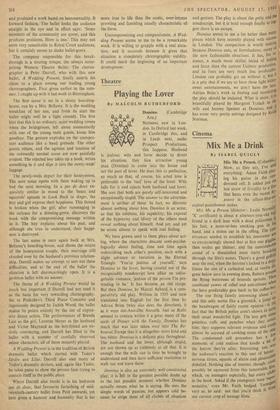Theatre
Playing the Lover
By MALCOLM RUTHERFORD
Domino. (Cambridge
Arts.)
NOTHING new in Lon- don. In Oxford last week, in Cambridge this, and in Leeds next, under
Prospect Productions, this happens. Husband is jealous; wife and lover decide to divert his attention; they hire attractive young man (Domino) to come into the house and act the part of lover. He does this to perfection, so much so that, of course, his acted love is preferable to the 'real' love of the lover. Wife falls for it and rejects both husband and lover. She sees that both are purely self-interested and exceptionally stupid. The answer to the advertise- ment is neither of these. In fact, we discover almost nothing about him. Domino is an actor, so that his coldness, his capability, his exposal of the hypocrisy and idiocy of the others need reveal nothing about himself. And yet, and yet he seems almost to speak with real feeling.
We have grown used to these plays about act- ing, where the characters descant semi-psycho- logically about feeling, time and time again redescribing each other's position, each with a slight advance or variation in the Eternal Triangle. 'You're jealous of yourself,' says Domino to the lover, having created out of the recognisably nondescript love affair an unfor- gettable romance, 'jealous of the person I'm pre- tending to be.' It has become an old recipe. But then Domino, by Marcel Achard, is a com- paratively old play. Written in 1935 and now translated into English for the first time by Adrian Brine (who also does the direction), it as it were out-Anouilhs Anouilh. Just as Rollo seemed to contain within it a great many of the seeds of Dinner with the Family, Domino has much that was later taken over into The Re- hearsal. Except that it is altogether more kind and less bitter. Domino is a delicate play throughout. The husband and the lover, although stupid, are not shown up as ruthlessly as all that. It is enough that the wife can in time be brought to understand and then have sufficient resolution to walk out and leave them.
Domino is also an extremely well-constructed play; it is tbft in the greatest possible doubt up to the last possible moment whether Domino actually means what he is saying. He uses the simple words of passion, but appears cold be- cause he strips them of all cliches of situation and gesture. The play is about the petty and the nondescript, but it is bold enough finally to sulk gest there is an escape.
Domino seems to me a lot better than rnallY pieces which have recently played with success in London. The comparison is worth making because Domino uses, or foreshadows, manY.ni the now fashionable situations. It has, for in- stance, a much more skilful blend of feeling and farce than the current Ustinov productiori. and its lines are very much less predictable.. London can probably get on without it, but lt is a pity that if we are to have these light bitter- sweet entertainments, we don't have the best' Adrian Brine's work in finding and translating the play should be imitated. What is more, it 0 beautifully played by Margaret Tyzack as the wife and Jeremy Spenser as Domino, and has some very pretty settings designed by Keith Norman.






























 Previous page
Previous page